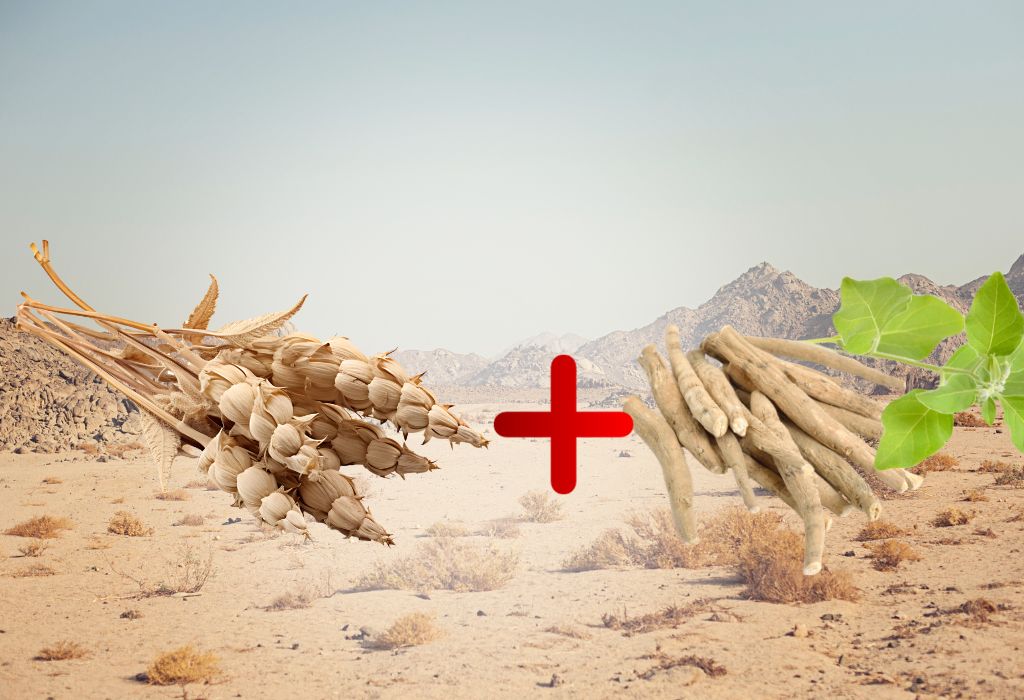
Can You Take Cistanche And Ashwagandha Together?
Cistanche and Ashwagandha are two herbs used in traditional medicine for centuries. They both have unique properties and health benefits, which make them popular among people looking to improve their overall well-being. Many people wonder if it is safe to take Cistanche and Ashwagandha together. In this article, we will discuss the potential benefits and risks of combining these two herbs to seek an answer to the question, "Can you take Cistanche and Ashwagandha together?".
Before exploring further, please read the disclaimer located at the end of this webpage.
The Similarities And Differences Between Cistanche And Ashwagandha
Cistanche and Ashwagandha are two herbs used in traditional folk medicine and are attracting the research community's attention for their potential health benefits.
Although these two herbs have the same ability to help the body adapt to stress and improve its stress resistance, there are still differences that users should know.
Read more:
The Similarities

Both Cistanche and Ashwagandha, rooted in traditional medicinal practices, exhibit similarities in certain aspects.
Firstly, these herbs have a history of traditional use in many cultures. Cistanche, commonly used in traditional Chinese medicine, and Ashwagandha, a dietary staple in Ayurveda, signify cultural appreciation and recognition of their potential health benefits.
Secondly, both herbs are recognized as adaptogens, demonstrating the ability to help the body adapt to stress and enhance resilience. This common characteristic makes them potential contributors to stress management and overall recovery.
Thirdly, Cistanche and Ashwagandha are beneficial for brain health. Ashwagandha helps support mental health and reduce stress [1], while Cistanche may help support brain function over long-term memory.
Furthermore, numerous studies have shown that Ashwagaganha and Cistanche have a positive impact on testosterone levels, making them potential options for individuals looking to improve hormone levels and support function sex naturally.
Learn more: Cistanche Sexual Benefits: Does Cistanche Increase Libido?
The Differences

While Cistanche and Ashwagandha share traditional medicinal origins, differences in geographical origin, chemical composition, and traditional uses highlight their unique contributions that need to be noticed.
Regarding chemical composition, Cistanche is rich in echinacoside and phenylethanoid glycosides, while withanolides characterize Ashwagandha. These unique compounds are believed to be responsible for the individual healing properties of each herb.
Additionally, their traditional uses differ. Cistanche has historical associations with supporting male reproductive health, boosting energy, and aiding kidney function. In contrast, Ashwagandha is celebrated for its stress-reducing properties, mental health support, and immune system fortification.
You may also like: Fadogia Agrestis Vs Cistanche: What Should You Choose?
Cistanche Vs Ashwagandha: Which One Should You Choose?
Cistanche and Ashwagandha are safe for many individuals and can be used by many people seeking their potential health benefits.
Men And Women Who Want to Improve Their Reproductive Health:
As mentioned, Ashwagandha and Cistanche have been associated with supporting male reproductive health owing to the possible effects on testosterone levels, making it a consideration for men looking to improve their vitality, sexual health, and overall reproductive health.
People Struggling With Fatigue And Lack Of Energy:
With its well-known energy-boosting properties, Cistanche may be chosen by those who manage fatigue or desire a natural method to boost stamina and overall energy levels.
It is proven that both herbs prevent brain cell aging through experiments extending connective lifespan, producing new neurons, and improving sleep.
However, Ashwagandha has the advantage that it has more effective anti-stress properties than Cistanche.
Here are some cases when you should consider using Cistanche:
Kidney Health Advocates: Cistanche is associated with supporting kidney health in traditional Chinese medicine. Those looking for natural remedies or supplements to enhance kidney function may find Cistanche a suitable choice.
Besides, Cistanche helps people increase their ability of long-term brain: Cistanche has been identified for its ability to improve learning and memory, including The ability to form memories, store information, and re-access information that has been memorized.
Experiments have been conducted that show a restorative effect, helping to improve information consolidation dysfunction and enhancing the brain's ability to learn and form memories.
On the other hand, Ashwagandha helps protect the heart and supports diabetes curement [2].
According to some research, many people use Ashwagandha to promote heart health, including Regulating blood pressure and reducing high cholesterol levels in the blood.
A review study found that people with diabetes experienced significant reductions in blood sugar and lipid levels and increased insulin sensitivity after using Ashwagandha.

Can You Take Cistanche And Ashwagandha Together?
It is safe to take these two herbs together. There are no reported adverse interactions between Ashwagandha and Cistanche, and they may even offer complementary effects on hormone health.
However, it is crucial to emphasize the importance of consulting with a healthcare professional before absorbing any herbs into your routine, individually or in combination. This ensures that they are safe and appropriate for your specific health requirements.
Other Herbs You Can Take With Cistanche And Ashwagandha
Tongkat Ali

Combining Cistanche and Ashwagandha with Tongkat Ali is generally considered safe and even complementary in some cases. Ashwagandha is an adaptogenic herb known for its stress-reducing properties, while Tongkat Ali is commonly used for its potential benefits in improving men's vitality and overall health [3].
Because both herbs are stress-busters and energy-boosters, making them a dynamic duo. This combo might improve physical and mental performance, and it could be beneficial for your sexual health and hormone balance.
Learn more: Cistanche Vs Tongkat Ali: The Comprehensive Comparison
Horny Goat Weed
Horny goat weed contains chemicals that may help increase blood flow and improve sexual function [3]. It also contains phytoestrogens, chemicals that act like the hormone estrogen.
People use horny goat weed to treat erectile dysfunction (ED), sexual problems, weak and brittle bones, postmenopausal health problems, and other conditions.
Like Tongkat Ali, Horny Goat Weed is also completely safe when used with Cistanche and Ashwagandha. You can get them all at the same time.

Conclusion
In summary, Cistanche and Ashwagandha have unique compounds that offer potential health benefits for our well-being. Additionally, other herbs like Tongkat Ali and Horny Goat Weed may complement the effects of Cistanche and Ashwagandha. So, if you are considering taking these herbs for their potential health benefits or wonder “Can you take Cistanche and Ashwagandha together?”, be sure to do your research and consult with a professional to find the best combination for your specific needs.
References
- [1] Ahlawat, S., Saxena, P., Ali, A., Khan, S., & Abdin, M. Z. (2017). Comparative study of withanolide production and the related transcriptional responses of biosynthetic genes in fungi elicited cell suspension culture of Withania somnifera in shake flask and bioreactor. Plant Physiology and Biochemistry, 114, 19–28. https://doi.org/10.1016/j.plaphy.2017.02.013
- [2] Sultan Zahiruddin, Parakh Basist, Parveen, A., Parveen, R., Khan, W., Gautam, G., & Ahmad, S. (2020). Ashwagandha in brain disorders: A review of recent developments. Journal of Ethnopharmacology, 257, 112876–112876. https://doi.org/10.1016/j.jep.2020.112876
- [3] Lazarev, A., & Eduard Bezuglov. (2021). Testosterone Boosters Intake in Athletes: Current Evidence and Further Directions. Endocrines, 2(2), 109–120. https://doi.org/10.3390/endocrines2020011
Author

Product Disclaimer
Including an ingredient or study does not evaluate, endorse, or recommend any Vinatura product or any third-party product. Some ingredients discussed may not be used in any Vinatura product.
The content of the articles has not been evaluated by the Food and Drug Administration (FDA) and is not intended to promote or endorse any specific product. Any products sold on this website are not intended to diagnose, treat, cure, or prevent any disease.
Opinions and Endorsements
Any claims, statements, or opinions expressed in the articles are those of the author(s) and do not necessarily reflect the views or opinions of the manufacturers of the dietary supplement products. The products sold on this website are separate from the content of the articles and are not directly endorsed or associated with the information presented here.
Liability Disclaimer
The author(s) of the articles, website, and manufacturers of the dietary supplement products do not assume any liability for any potential consequences arising from the use of the information provided in the articles. Ingredient effects, dosages, and safety vary by individual, formulation, and context; some ingredients interact with medications or may be unsuitable during pregnancy or lactation. It is recommended that individuals consult with a qualified healthcare professional before making any dietary or lifestyle changes, including the use of dietary supplements.
Product Usage
Please refer to the product labels and packaging for specific usage instructions and guidelines for the dietary supplement products sold on this website.
Customer Support
For any concerns or questions regarding the dietary supplement products, please contact our customer support team, who will be more than happy to assist you.





Leave a Comment
Be the first to comment.
What do you think?